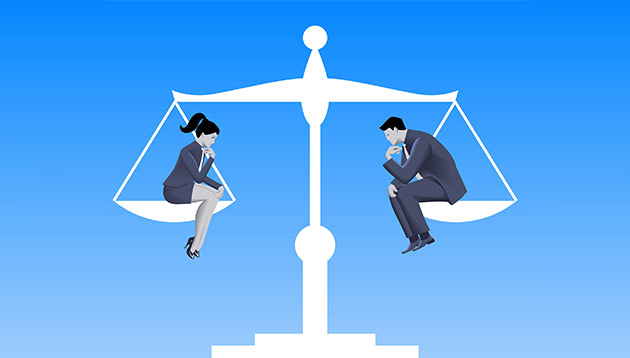
There are some assumed truths that we, as a society, don’t question as much as we should. In the era of fake news, alternative facts, and conspiracy theorists who act like living internet memes, it’s hard to know what’s true anymore. Even when things are proven definitively false, people still cling to them. Why else would creationism still exist?
However, there are a few over-arching assumptions that I feel deserve more than just skepticism. There are some common talking points that have significant flaws solely because of their implications. You don’t even need to compile statistics or conduct extensive research. Just asking questions that build directly from the logic are sufficient to expose underlying flaws.
One talking point that keeps coming up in the world of gender politics is the gender wage gap. It’s been an issue for years, but keeps coming up in everywhere from Hollywood to tech companies. Even though I’ve talked about gender politics many times before, I’ve avoided this particular issue because everyone can find numbers to throw at it to support their position. As a result, there’s not much to write about.
That’s why I’m not going to try and debate it with economic studies or statistics. There are plenty of other people far smarter and more qualified to do that sort of thing. Instead, I want to scrutinize this common and contentious issue in a few simple ways that I hope demonstrate why it’s such a flawed issue to begin with. I believe this can be accomplished by asking just a few simple questions.
If Women Are Always Paid Less, Then Why Would A Company Hire Men?

I’m not an economist, a financial specialist, or a business expert, but I understand logistics as well as most people. Last I checked, a good business seeks to maximize profits and minimize costs. That’s the hard of nearly every challenge for every business, whether they’re selling widgets or time shares.
With that in mind, why would any business hire men if they can save money by hiring women? If women are every bit as capable, as many in the halls of gender politics argue, then there’s no reason for them to favor men. If the gender wage gap is true, then any business that hires men is intentionally throwing money away.
I get that the economics of wages, combined with the complexities of gender dynamics, create all sorts of confounding factors. That doesn’t change the math or the incentives surrounding profit. The basics of the wage gap imply that there’s a system in place that allows companies to pay women less for the same work, but they’re not taking advantage of it.
That just doesn’t make sense and I rarely hear those who bemoan the pay gap address this. I feel like since most people don’t understand business or economics, it’s easy to ignore and people just take the path of least resistance.
What Exactly Constitutes Equal Work?

This might be entirely subjective in most cases, but the idea of “equal pay for equal work” is becoming a bigger and bigger part of this issue. I hear politicians, pundits, and protesters using this phrase in any number of speeches in debates. However, they never go into detail.
Equal pay is one thing, but equal work is something else entirely. Human beings are not machines. Even if two people have the exact same skill level, they’re not always going to produce the same product with their work. That’s just not physically possible for non-cyborg humans.
I don’t doubt that a woman can be just as good as a man in many tasks, from typing up reports to carving furniture out of wood like Ron Swanson. Most of these skills are not physically impossible for able-bodied people, regardless of their genital configuration. Even if they’re capable, though, how do you decide that their work is equal?
Is it determined by how much time they put in? Is it determined by the volume of the work or the amount of money it generates? Most businesses use a mix of workers that have a wide variety of talents, skills, and abilities. Given those constraints, the whole idea of equal work seems to break down.
I’m not saying there aren’t cases where a woman is paid less for doing the same work as a male counterpart. That probably has happened before and will happen again. I just don’t see how that can be address beyond a case-by-case basis.
How Do You Enforce Perfectly Equitable Pay?

Beyond just determining what equal work is, there’s the whole concept of enforcing that equality. Passing laws is the most obvious possibility, but implementing those laws can be tricky. In the state of Georgia, there’s a weird law that prohibits people from living on a boat for more than 30 days. How do the authorities go about enforcing something like that?
Like I said before, businesses have all sorts of complex machinations. People have a variety of skills, roles, and duties. Not everyone works the same hours and not everyone will work with the same efficiency. Do they all still get paid the same? How would you even go about determining what constitutes fair pay in every instance?
It’s not just unfeasible. It’s physically impossible. There are so many subjective forces at work and everyone will argue that their work contributed more value than everyone else’s. They all can’t be right, but they all can be wrong and if everyone is wrong, then how can you know the truth? Even if the idea of equal pay seems good and just, it still breaks down when you try to apply logistics.
What Else Can People (Reasonably) Do?

In 1963, the Equal Pay Act was passed and signed into law by President Kennedy. This law stated outright that no employer could utilize sexist discriminatory practices when determining the wages of its employees. That law has been on the books ever since. It’s a federal law so it applies to every state and territory. It can be enforced by legal resources at every level of government.
Paying someone less because they’re a woman is already illegal and has been for decades. What else can people do? Like I said, enforcing a law is difficult, but the law is still there. However, in the same way that drug laws didn’t make illicit drugs go away, laws concerning equal pay don’t make the gaps go away.
Laws can only provide rules. They can only do so much to change society as it is. The pay gap has significantly narrowed, but it’s not perfect. Nothing ever is. Beyond abolishing wages for everyone, which may actually happen one day, what else can be done? I get that many favor hiring more women and minorities, but is that really reasonable for every business in every sector of the economy?
Again, I see the merit and the passion behind the idea. Someone getting paid less for their work just because of their gender is a gross injustice, but righting that wrong in such a complex world just isn’t that easy. Nothing ever is. I know these questions can’t be fully answered, but I hope that simply asking them offers a more complete perspective of the issue.


